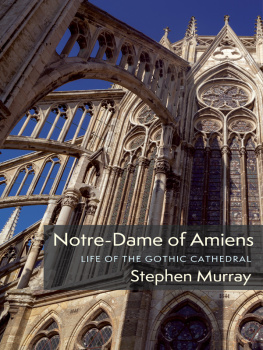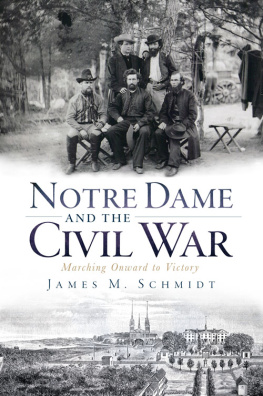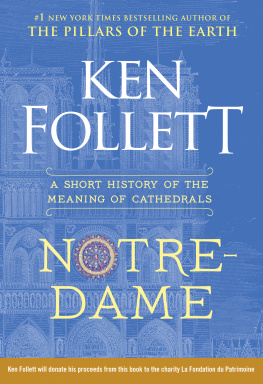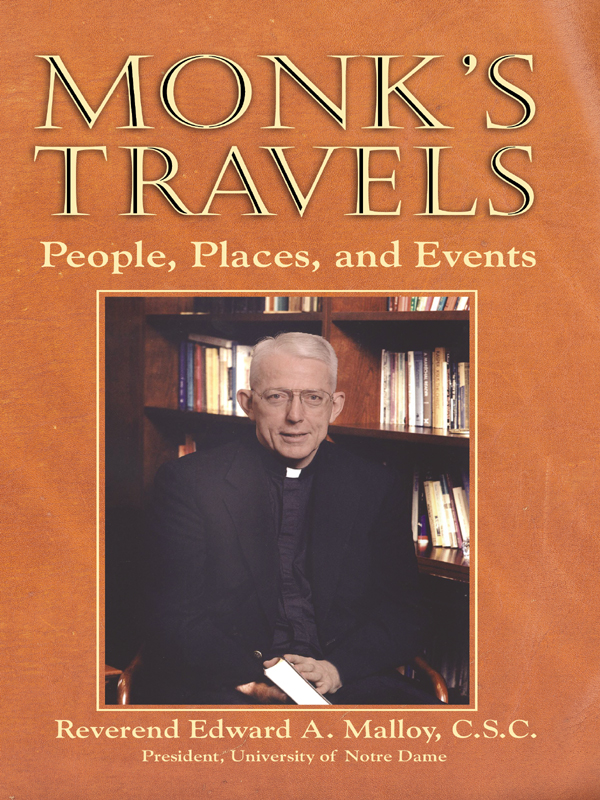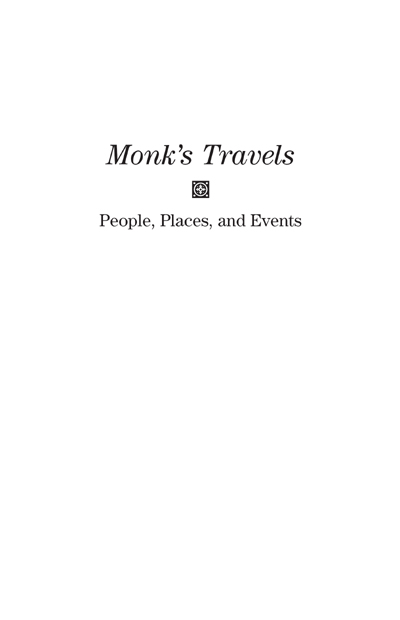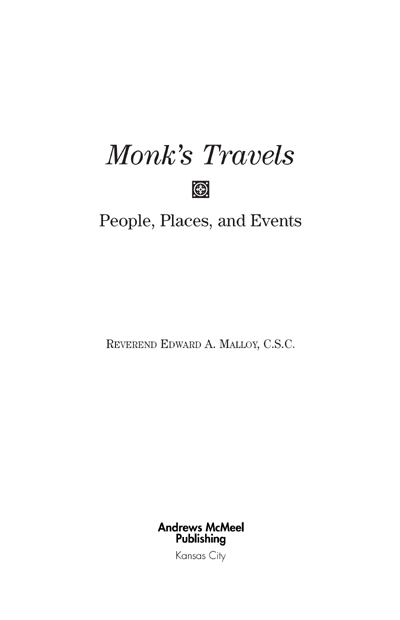Also by Reverend Edward A. Malloy, C.S.C.
Monks Reflections:
A View from the Dome
Monks Travels People, Places, and Events copyright 2004 by Reverend Edward A. Malloy, C.S.C. Printed in the United States of America. No part of this book may be used or reproduced in any manner whatsoever without written permission except in the case of reprints in the context of reviews. For information, write Andrews McMeel Publishing, an Andrews McMeel Universal company, 1130 Walnut Street, Kansas City, Missouri 64106.
Library of Congress Cataloging-in-Publication Data
www.andrewsmcmeel.com
Malloy, Edward A.
Monks travels: people, places, and events / Edward A. Malloy.
p. cm.
E-ISBN 978-0-7407-9299-1
1. Malloy, Edward A.-Travel. 2. University of Notre Dame-Presidents-Travel. 3. Voyages and travels. I. Title.
G465.M363 2004
910.41-dc22
Author photo by Linda Dunn
Cover design by Tim Lynch
2004047733
ATTENTION: SCHOOLS AND BUSINESSES
Andrews McMeel books are available at quantity discounts with bulk purchase for educational, business, or sales promotional use. For information, please write to: Special Sales Department, Andrews McMeel Publishing, 1130 Walnut Street, Kansas City, Missouri 64106.
I dedicate this book to my sisters,
Mary Long and Joanne Rorapaugh,
in appreciation of their love and
support through the years.
 CONTENTS
CONTENTS
PREFACE
This book has its roots in experiences I participated in as an undergraduate student. Between my junior year of college and the end of my first year of seminary, I participated in three successive summer service projects in Latin America. On the first trip to Aguascalientes, Mexico, I was asked by my fellow volunteers to keep a diary of our trip so that we could submit a report to the benefactors who had helped make it possible. I found that keeping a diary not only served that pragmatic purpose but also helped me to focus on the events that were most significant and influential. It also provided a handy reprise of the trip as a whole. On my second and third trips to Peru and Mexico, I also kept a diary, and I discovered that many members of my family and extended friendship group enjoyed sharing vicariously in the experience when I sent a copy of my diary to them.
Many years later, when I first began traveling abroad as President of Notre Dame, I decided to take the same tack. My initial audience was intended to be the members of my family, close personal friends, and fellow members of the University administration. However, I found rather quickly that other people, when they learned about the diary, expressed a desire to have access to its contents. As a result, much more quickly than I had originally imagined, the circle of those who were recipients of my diaries expanded quite broadly. It began to include the members of the University Board of Trustees, Advisory Council members, members of the Alumni Board and past Alumni presidents, and some of the major benefactors as well.
As time went on, I began to modify the contents somewhat by including an early summary of my personal activities since the last diary. This was intended partially as material for the Archives as well as a kind of quick summary of major events on and off the campus that had taken place in this country.
Right from the start, my intention had more to do with capturing the spirit of daily events on my international trips than with providing a finely honed, stylized document. My diaries were never intended to be literary documents or to call for a rewriting after the fact. My style of composition was generally at the end of each day to spend some time writing in hand the major events and persons that I had encountered during the day. Some trips turned out to be more exciting than others. Some of the places that I visited were strange and exotic, and others were more familiar.
On the vast majority of my international trips, I have been in the company of one or more members of the University administration and/or their spouses. In that sense, the prism through which I have interpreted things included regular conversations with my fellow travelers, with whom I also shared experiences of prayer, meals, and entertainment. On none of my trips did I go primarily as a tourist, but there have been good opportunities to simply see the land, enjoy the culture, and appreciate the diversity of the worlds population.
A quick summary of the constituencies that were often visited would include Notre Dame graduates, representatives of various church communities, other higher education institutions and systems of education, government leaders, and members of the business and civic communities. I have had the good fortune to visit with many heads of state and cabinet-level officers as well as Catholic Church leaders and representatives of other faith traditions. But I also spent a good amount of time with ordinary folk who helped interpret the culture and/or provided an entree to situations that I would otherwise never have had access to.
Overall, I have been blessed with good health on my trips, but I had a few setbacks along the way as well: altitude sickness in Peru and Tibet; intestinal disorders in Mexico, Chile, and a few other Latin American countries; and temporary rumblings from strange food in various places in Asia and in Africa. These periods of unpleasantness were far outweighed by the stimulating and enjoyable times that have given me a much broader horizon of experience and that I continue to draw on in my professional responsibilities.
Ann Tyler wrote a novel entitled The Accidental Tourist that is about a man who is forced to travel but does not want to have any new experiences. He wants to guarantee his safety and security by making sure that everything is predictable and familiar. My goal on my trips was just the opposite: not to do anything too foolish, but to be open to an endless round of new experiences and possibilities. Along the way I have flown in every kind of airplane and in helicopters, been on various kinds of ships and boats, traveled by car, bus, and train, and even boarded an occasional camel or horse (if only to have a dramatic picture taken). I have been stopped by police but never arrested. I have been in semi-dangerous situations but never personally harmed.
One tradition of our traveling groups was to celebrate daily Mass together no matter where we might be. I have taken special pleasure in celebrating Mass in a number of Communist countries or countries recently freed from Soviet control. Among the Masses I have participated in, none were more memorable than the times that I concelebrated with Pope John Paul II in his private chapel at the Vatican.
In the course of my travels, I visited many of the best universities of the world, and some neophyte institutions as well. It is relatively easy for a university person to feel comfortable in another higher education institution. We share a general mission and often have the same kinds of problems. The leaders of these institutions have been invariably generous and kind as they provided tours of their schools or gathered us together for special convocations or other types of meetings. Obviously, I felt a special affinity for the Catholic universities that I visited. They are one concrete manifestation of the small c notion of the Catholic Church, that is, as a universal presence of Christ the Teacher and Christ the Light.


